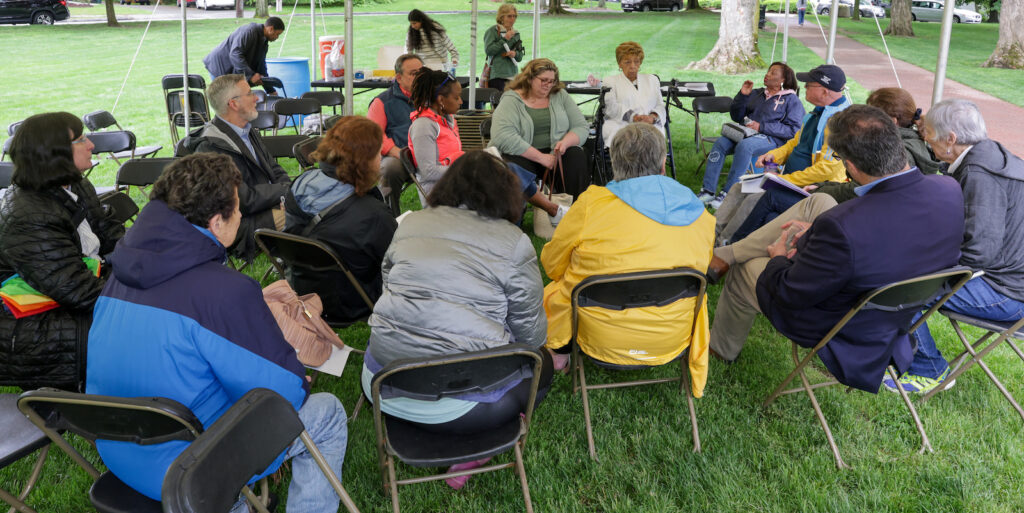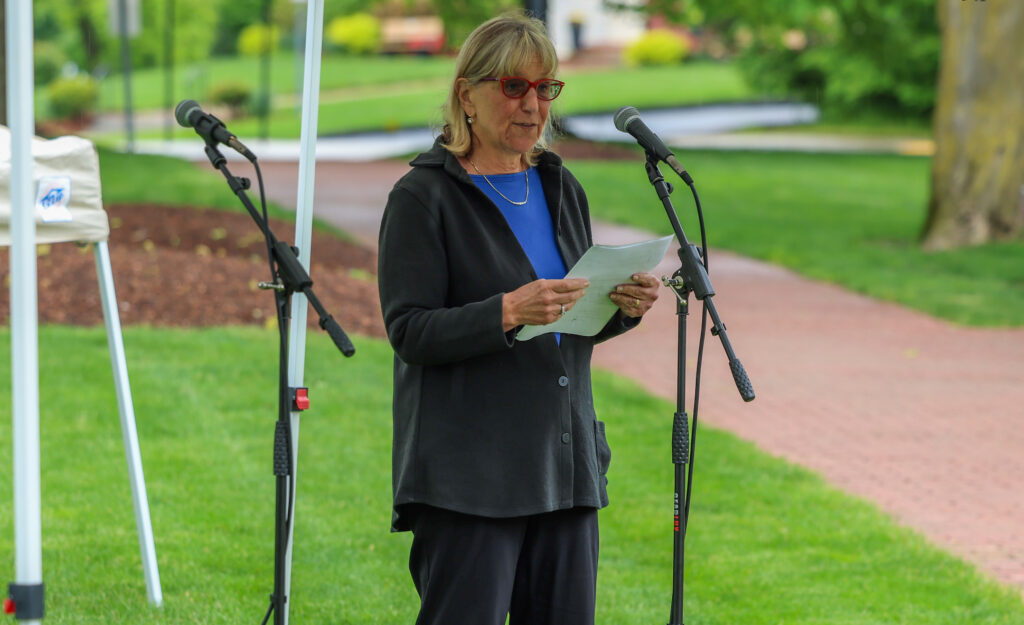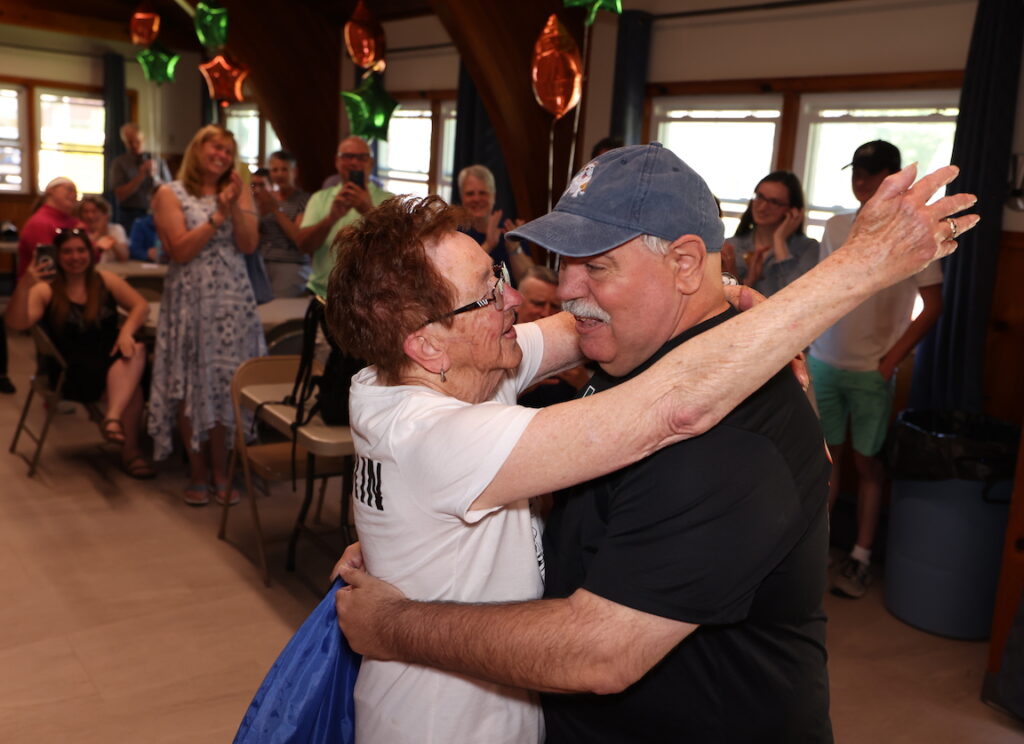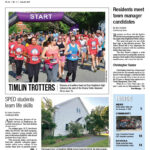
Attendees at the Reading Frederick Douglas Together event May 18 at the Town Common have a discussion. PHOTO/JOHN CARDILLO
When Frederick Douglass spoke at Hayden Rowe Hall in Hopkinton on April 29, 1842, as part of a Massachusetts Antislavery Society event, the formerly enslaved man was just starting a career that would make him famous and take him around the world.
Two centuries later, a group of residents and guests paid tribute to Douglass last month with a reading of his influential speech, “What to the Slave is the Fourth of July?”
The Reading Frederick Douglass Together (RFDT) event was organized by Hopkinton Historical Society vice president Anne Mattina, who last summer started a fellowship with the organization Mass Humanities to study Douglass. She also received a Mass Humanities grant to put together the May 18 event, which was sponsored by the Historical Society as well as the Hopkinton Freedom Team.
Douglass escaped slavery in Maryland as a teenager with help from his then-fiancee. After getting married in New York and settling in New Bedford, he was hired as an agent by the Massachusetts Antislavery Society.
“He originally spoke about the evils of slavery, but people responded to his experiences as a slave, so the society pushed him to talk about his personal experiences,” Mattina explained. “He was only on the circuit for a year-and-a-half when he came here. By the time he delivered that [Fourth of July] address in New York state 10 years later, he was internationally famous.”
In his legendary speech, given July 5, 1852, in Rochester, New York, Douglass noted the hypocrisy of a nation that celebrated its freedom while holding Black people as slaves.
“What, to the American slave, is your 4th of July? I answer: A day that reveals to him, more than all other days in the year, the gross injustice and cruelty to which he is the constant victim,” Douglass said. “To him, your celebration is a sham; your boasted liberty, an unholy license; your national greatness, swelling vanity; your sounds of rejoicing are empty and heartless; your denunciations of tyrants, brass fronted impudence; your shouts of liberty and equality, hollow mockery; your prayers and hymns, your sermons and thanksgivings, with all your religious parade, and solemnity, are, to him, mere bombast, fraud, deception, impiety and hypocrisy — a thin veil to cover up crimes which would disgrace a nation of savages. There is not a nation on the earth guilty of practices, more shocking and bloody, than are the people of these United States, at this very hour.”
Douglass’ comments continue to be relevant — even more so following the racial unrest that was spurred by the death of George Floyd in 2020, Mattina said, which is why she wanted to bring the RFDT event to Hopkinton. Similar events have been held in other communities since it debuted in 2009 in Boston.
About 60 people showed up to the Town Common on a rainy Saturday to take part in reading excerpts from the speech and talking about its significance. State Senate President Karen Spilka, who recently had a bust of Douglass installed at the State House — the first permanent bust there of a person of color — provided opening remarks. State Rep. James Arena-DeRosa and former Hopkinton Select Board chair Muriel Kramer also participated. U.S. Rep. James McGovern had planned to take part but ran into travel issues.

State Senate President Karen Spilka speaks at the RFDT event. PHOTO/JOHN CARDILLO
“The purpose behind this whole movement is to get people to recognize the impact his words still have on us today, how reading and reflecting on this speech from 1852, it could have been written and delivered in 2024,” Mattina said. “Obviously, the language is much more formal, but the questions he asks in the speech and the way he asks people to understand, what does any of this mean to a slave — promises of freedom and pursuit of happiness, it doesn’t mean anything to a slave. Those words still resonate.”
Added Mattina: “Like a lot of people, I’ve been discouraged by the discourse about race over the last few years. … The more you know, the more you understand history and know about our collective past, the more informed our conversations can be. We can start working through these thorny issues, like what does it mean to be a Black person in our society today, and whose responsibility is it to examine these questions?”
Mattina said she’s gotten a great response from the event, and she hopes to hold it again in the future — pointing to Juneteenth, which commemorates the end of slavery in the United States, as perhaps a more appropriate day for it next time.
“I think people are interested,” Mattina said. “And it’s a positive for the town and something we can be proud of, both our history and our interest in these kinds of things.”

At his 60th birthday party on June 2, Scott Mackin receives a hug from his mother, June. PHOTO/JOHN CARDILLO
Mackin turns 60
Scott Mackin, best known for his contributions to Hopkinton High School athletics as a manager, coach and fan, celebrated his 60th birthday with a party June 2 at the Upton VFW Hall.
Family and friends turned out to show their support for Mackin, who has been involved with HHS athletics since his teenage years.
Mackin also takes part in Special Olympics events in town.






















0 Comments